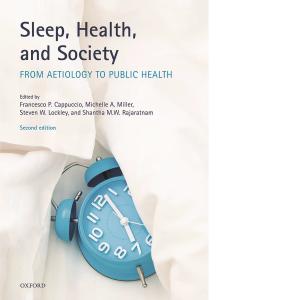New book covers the A to Zzzzzz of sleep
• New book examines how sleep - and lack of it - affects our lives
• Discusses the effect shift work, short sleeping patterns and technology have on our lives
• Explores how sleep affects our health, its effect on anti-cancer treatments, cardio-metabolic disease, epilepsy, and pregnancy
A new book highlights how living in our increasingly sleep deprived society is affecting our health.
Sleep, Health and Society, edited by academics from the University of Warwick aims to explain to the non-expert the complex medical, sociological, technical and scientific factors affecting us all. Working in conjunction with Brigham and Women’s Hospital, Harvard Medical School and Monash University, the academics explore the effects on health and wellbeing of our increasingly sleep-deprived society.

The book examines changes in modern society such as longer working hours, more shift work, 24/7 availability of commodities, and 24-hour global connectivity - which have been associated with a gradual reduction in sleep duration and sleeping patterns in developed countries.
The authors examine the evidence linking less sleep to common diseases such as obesity, diabetes, hypertension, heart disease, and stroke, and how it may even be responsible, in the long term, for premature death.
Co-editor, Francesco Cappuccio, Professor of Cardiovascular Medicine & Epidemiology, University of Warwick said: “Throughout our life we spend approximately a third of our time asleep. In this book we aim to answer questions many people have about sleep. We look at the potential implications of sleep disturbances for both our society and also for individuals.”
The book also focuses on the dangers of drowsy driving, which has been the cause of, or linked to, numerous incidents such as 2001 Selby rail crash. The authors highlight the potential dangers of underreporting drowsy driving especially within professions such as taxi, train and lorry drivers, and airline pilots. They call for further research to find methods of predicting the risk of traffic accidents due to being sleepy at the wheel.
Sleep, Health and Society provides historical accounts of how sleep patterns have changed over time. Although poor sleep is seen as a modern phenomenon the quality of pre-industrial sleep was poor, owing to illness, anxiety, and environmental issues. Large portions of the labouring population are believed to have suffered from sleep deprivation. Before the Industrial Revolution, sleep in western households was very different from today mostly due to a lack of artificial light. Sleep was usually segmented into two intervals of roughly three hours apiece bridged by up to an hour or so of wakefulness.
Today lack of sleep is linked to common diseases such as obesity, diabetes, hypertension, heart disease, and stroke, and may even be responsible, in the long term, for premature death.
Co-author Dr Michelle Miller, Associate Professor (Reader) of Biochemical Medicine, University of Warwick said: “Sleeping seven to eight hours per night appears to be optimal for health, but there is a need for improved measurements of sleep quantity and quality. Furthermore, the genetic regulation of normal sleep is complex and often shows strong environmental interactions.”
The second edition of the book includes a chapter by representatives from Narcolepsy UK examining what it is like to be a patient living with a disabling sleep condition. The authors conclude there is no single reason why we need sleep but that sleep helps consolidate our memories, restores energy stores, clears wastes from the brain, is important for immune and metabolic function, and overall health.
The book is being launched on Thursday 7th June at Warwick Books, 24 Market Place, Warwick, CV34 4SL
Sleep, Health, and Society, From Aetiology to Public Health (Second Edition) is edited by Francesco P. Cappuccio, Michelle A. Miller, Steven W. Lockley, and Shantha M. W. Rajaratnam
6 June 2018
The launch of Sleep, Health and Society is taking place on 7th June 7:00-8:30pm at Warwick Books, 24 Market Place, Warwick, CV34 4SL Tickets are limited, cost £5 which includes canapés, a glass of prosecco or cordial and a gift. Ticket holders are to be entered into a draw for a signed copy of the book rrp £34.99. The speakers (Dr Michelle Miller, Professor Cappuccio and Mr Matt O’Neill) will be available for a Q & A session and to sign advanced copies of the book, which will be on sale at the 30% discounted price of £24.49 (cash only*). *A discount code will be available for those who wish to place a credit card order direct with Oxford University Press Tickets are available from 24 Market Place, Warwick, CV34 4SL 01926 499939 www.warwickbooks.net
For more information contact Nicola Jones, Media Relations Manager, University of Warwick N.Jones.1@warwick.ac.uk or 07920531221
